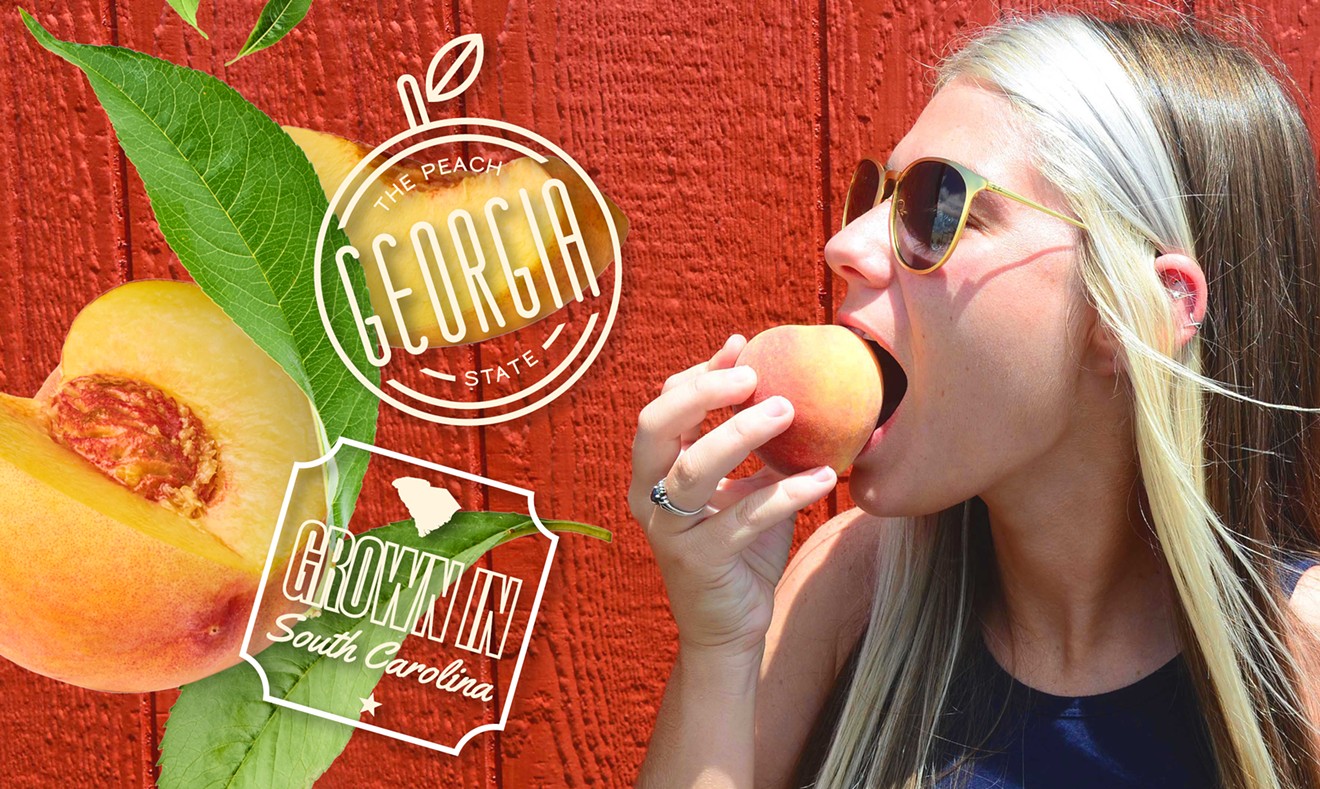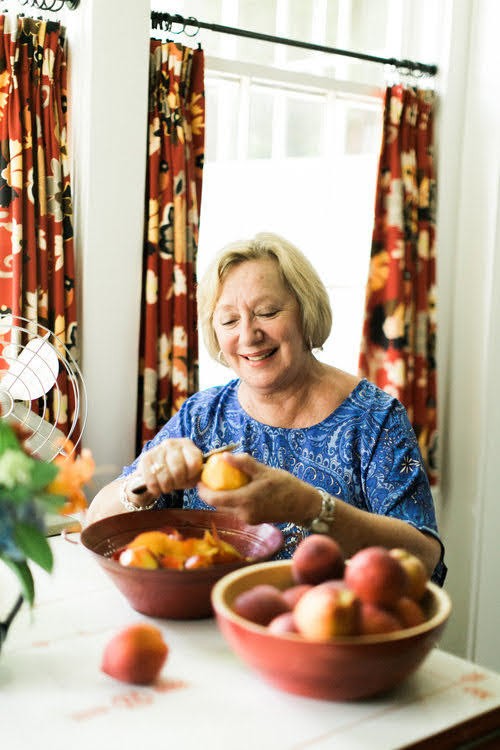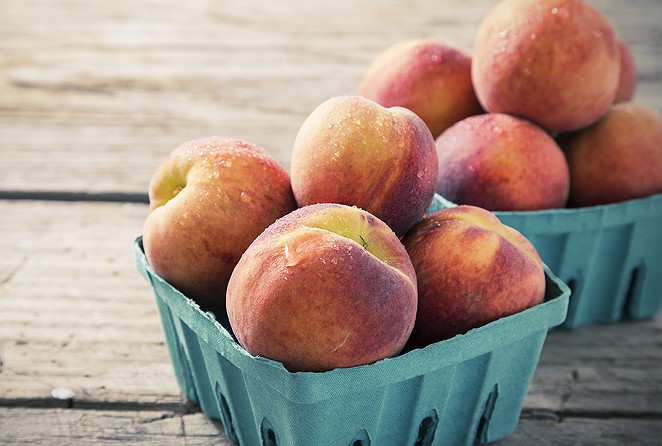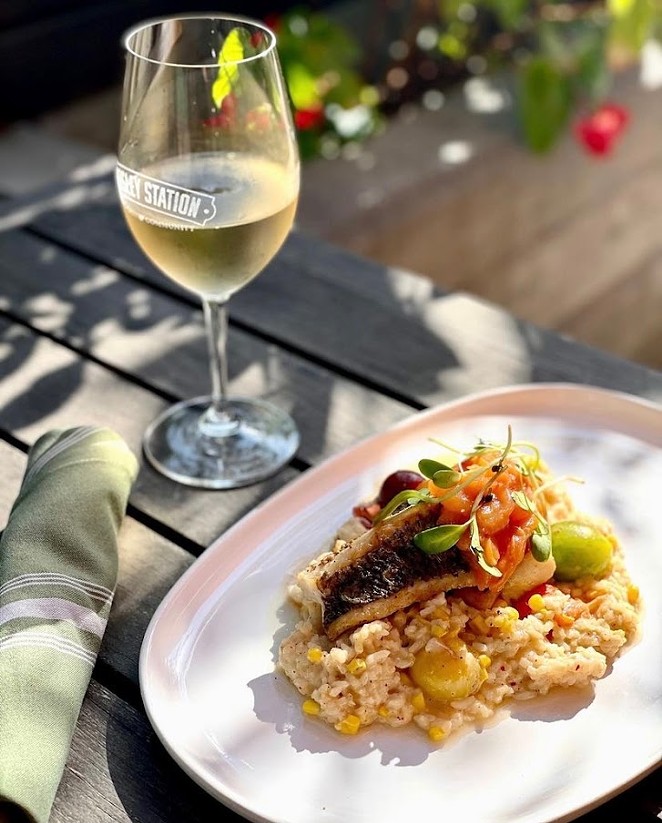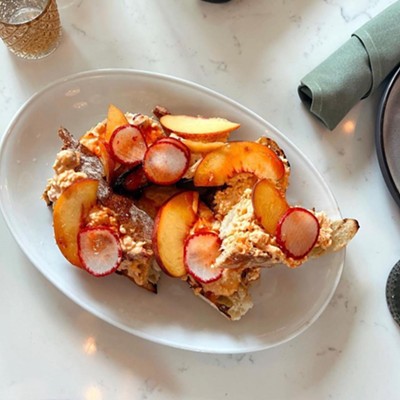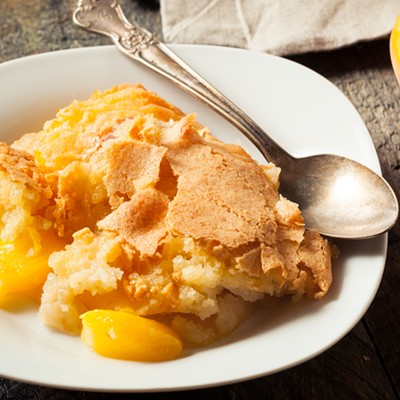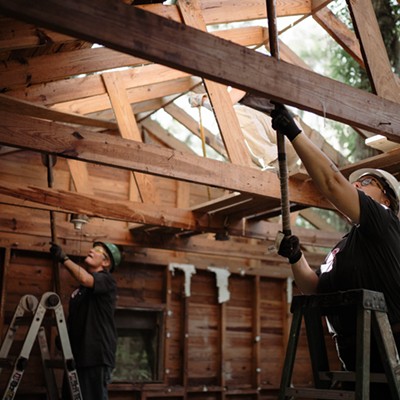On June 16, 1982, President Ronald Reagan signed an edict declaring August as National Peach Month, and 40 years later, we should celebrate our state’s official fruit to the fullest!
Throughout the summer months, one can find roadside stands, bushel-filled pickup trucks, farm stands, and fresh markets filled to the brim with multiple varieties of peaches set to quench the sweet Summer thirst with a simple, southern treat.
From May until the end of August, Savannah residents and visitors can find the freshest peaches from both Georgia and South Carolina featured on summer menus throughout the Lowcountry to honor the fruit that has brought so much to the region.
Yet, there’s so much more to the simple peach than meets the eye, from how and where it’s grown to the rotation of varieties, to the support for the local communities and the support in return from the same people.
It’s a food of tradition, steeped in Georgia history, as it was the first place in America that grew the Chinese peach.
“Georgia is ‘The Peach State’ because we sort of created the American peach industry,” said Will McGehee of Pearson Farms in Fort Valley, Georgia. “That’s where it all started.”
According to Georgia history, this state has been growing peaches commercially for longer than any other state in the nation.
Farmer Raphael Moses was one the first to ship the fruit in 1851. Because fresh peaches have such delicate skin, it was said he protected them in Champagne boxes to help preserve their flavor and texture (a technique that’s still used for shipping fine fruit, according to Gourmet magazine).
“It wasn’t until the late 1800s when Georgia peaches gained fame,” McGehee said.
In 1870 in Macon County, horticulturist Samuel H. Rumph grafted a Chinese peach variety onto another tree and named the large, juicy, yellow-fleshed result after his wife, Elberta. The Elberta peach was not only tender and sweet but also hardy and produced abundantly.
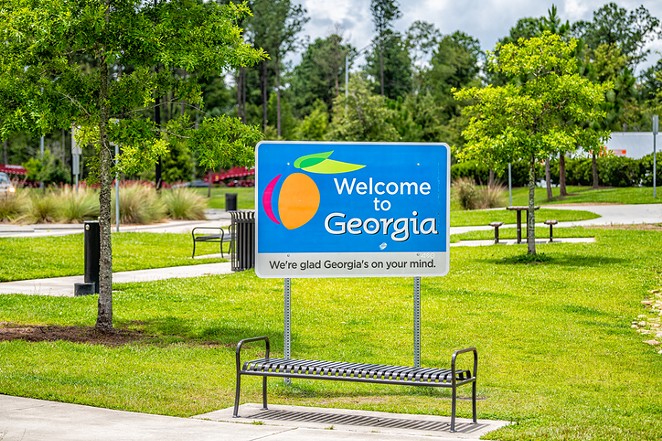
“With the creation of the Elberta peach, it was selling up and down the east coast—Philly, New York, Boston—everyone had heard of the Georgia peaches. It was kind of like a mini gold rush in the 1870s,” McGehee explained. “People just flocked to the middle part of Georgia and planted this Elberta variety of peaches. All of the peaches in the late 1800s and early 1900s came from Georgia. We just knew how to do it. All that tradition and history being passed down from generation to generation… we have a lot of know-how other people don’t.”
Across the state line in South Carolina, they may not be the official peach state, but they do produce and sell more peaches than in Georgia. During a typical year, South Carolina grows nearly 60,000 tons of peaches on over 18,000 acres, according to data released from the state. However, South Carolina fruit growers echo the success of their peaches.
“As a South Carolina peach grower, we always feel a bit jaded that Georgia has the tagline of ‘The Peach State,’” teased Spencer McLeod of McLeod Farms, home of Mac’s Pride Peaches. “There’s inherently been a friendly competition between us [South Carolina farmers] and Georgia. I’m good friends with many of the folks and we grow similar varieties.”
IT RUNS IN THE FAMILY
McGehee stressed the friendly rivalries across state lines. “We’re a small family of farms between the two states and we know each other well. We work with each other every day and it’s more like a brotherhood between the two states. That’s the way it works.”
“I’m a bit biased in saying our peaches are better than Georgia,” McLeod said. “However, the bigger thing letting people know southeast peaches are the premiere peaches, no doubt.”
Georgia farmers mostly agree. “You’ve got these family farms with kind of a legacy… three, four, five generations old… and now everyone’s planting trees again, the industry is healthy and we’re growing once again. It’s an exciting time to be growing peaches in Georgia,” McGehee said with excitement. “Our generation peach farm has that next generation that’s back on the farm to carry it forward. It’s a healthy and exciting time to be in the peach business. We’re in a great spot right now.”
Addressing Georgia’s reputation as “The Peach State,” McGehee said, “We do a lot of traveling when we’re out and about visiting customers and we always ask people at hotels, bars, airports, ‘What do you think of Georgia?’ and they always say, ‘The Peach State.’ With what we do as an industry, we’re all working together with linked arms to push Georgia peaches.”
Additionally, McGehee was instrumental in the creation of “Genuine Georgia,” designed to market Georgia peaches at one price instead of creating competition between growers.
“There are four main farms,” McGehee, a fifth generation peach grower said. “They are Southern Orchards and Pearson Farms in Fort Valley, Dickey Farms in Musella and the Fitzgerald Fruit Farms in Woodbury. Those are the houses that pack Georgia peaches commercially all located around the middle part of the state.”
McGehee is no stranger to peaches as the son of Ann Pearson, founder of Pearson Farms.
“Family is so important. We’ve been farming peaches here since 1885. We’re one of the oldest peach-producing farms in the southeast. We [kids] sort of went off and did our own thing for a minute, but we all knew when it was time to come back home. In any generational business, we’re never told what we must do. They wanted us to choose to come back.”
McGehee said he and his cousin, Walt Pearson, formed the Genuine Georgia group to work together and help other Georgia peach farmers.
“My cousin, Walt does all the growing and I do the packing and sales. We realize the industry had been represented by a bunch of sales brokers not representing us the right way, so we started a group called Genuine Georgia and formed working together instead of every family doing their own thing. We present ourselves to the market, selling to Publix, Kroger, Trader Joe’s, Whole Foods, Costco… to everyone, but we do it as Genuine Georgia.”
This seems to have worked out well for the farmers of Georgia, but sadly, it’s reflected locally in a lack of Georgia peaches availability because so many Georgia peaches are leaving the state. Therefore, in most of coastal and southeast Georgia, South Carolina peaches are what’s available...and oftentimes, preferred.
David Landrigan, 41, is a chef who started on the line at age 13 and agreed about Georgia’s peach availability, having worked in the area for a while.
“Most of the time when I’m working with peaches, I get them from South Carolina,” Chef Landrigan said. It’s hard to get Georgia peaches sometimes because they seem to be sent out to the rest of the country. They’re able to buy the peaches from Georgia and they all get to advertise how they have Georgia peaches. That’s great. We’re getting peaches from South Carolina daily. They’re fresh, delicious, and fantastic, but they’re not Georgia peaches.”
Landrigan said chefs are enthusiastic about peaches right now. “
I’m not the only one who’s excited, I’m sure. From a chef’s point of view, when we order a bushel of peaches, they all come in ripe and delicious. All in all, it’s peach season and you can do so much with them. You can grill them, put them in ice cream, or just in a dessert in general. That’s a great way to go. Utilize them to the fullest in every course and every dish,” he said.
So, what, if anything, is the difference between Georgia and South Carolina peaches?
LOCATION, LOCATION, LOCATION
“The farms in Georgia are a little bit further south than we are in South Carolina,” McLeod explained. “The difference between the two states isn’t that much at all. You might say the Georgia peach has a sharper tip on the end, but the biggest thing for us both is differentiating ourselves from the West Coast. We have a different climate, more humidity—which can be a bit challenging because we have to deal more with insects and diseases than they do in the west, but we also think that’s what makes [here] conducive to a sweeter peach.,” he said.
“Everybody has their reputation,” McGehee stated. “In the middle part of the state where we are, there’s this intense, dense, rich, mineral-filled red clay that gives us a huge part of our advantage of growing peaches over other states.”
McGehee said the magic is right underneath the topsoil.
“This red clay is mineral rich. Other soil types drain quickly, but the red clay’s density helps it hold the water longer. It’s a fantastic way to keep your trees alive. When you’re in those hot days or it’s been a while since the last rain, the red clay gives us a real advantage. We love being able to grow in that than other soil types that might be around.”
“Where we are in South Carolina, I’m in a sand pit,” Spencer McLeod said. “Our soil is very sandy. Generally, you don’t want to have a tree in what we call ‘wet feet’ or wet soil. The bottom line is Georgia grows a good peach and South Carolina grows a good peach. I think the biggest thing that matters is being next to a tree and getting a peach fresh and it being something that was grown local. It will out-taste anything.”
Nationwide statistics have Georgia as the number three producer of peaches in the United States. South Carolina is second, behind California in the top slot.
McGehee described it further.
“They grow a lot of peaches in California. They have a dryer climate and great soils. That’s why they’re able to grow a lot of different fruits and vegetables. But, with the dryer climate and sheer distance you have to go get the fruit to the consumer, it’s a dryer-eating peach. It’s not as juicy.”
“Mealy” was the word he settled on.
“When you sit something in the cooler, you’re drying it out,” he explained. “I always recommend when people buy peaches… don’t put them in the refrigerator. If it’s room temperature, that’s where it needs to stay until it’s eaten. When something’s coming from California, it may be two weeks since it’s been picked or until someone buys it and eats it. Three weeks is a long time to dry out a peach. When you start putting things in a cold train for a long period, that’s when you start decreasing the chance of it being a good eating peach. So, having something fresh means a lot. That’s my thing.”
McLeod said, “When you talk to growers, they’ll say, ‘We don’t compete against each other; we compete against the West.’”
That seems to be the rule of thumb: Georgia and South Carolina against the West.
COBBLERING UP
McGehee couldn’t agree more. “California dwarfs everyone. The majority of the nation’s peaches are grown there. South Carolina produces more than Georgia, so when that gets thrown in my face, I tell them I’m doing my part,” he said with a laugh. “Georgia peaches are simply the best. We might not grow the most, but we grow the best.”
“A lot of people talk about the climate of where you grow peaches isn’t so much Georgia versus Carolina, but more so the East Coast versus the West Coast thing. When you think about our climate being hot during the day—which is what gives peaches their sugar—but then we don’t get down 55-60 degrees at night like they do on the West Coast and then the sugar development stops. It’s 83 degrees at midnight and you’re still sweating on the front porch here. You don’t get any rest here, so neither do the peaches,” he said.
In fact, he called it “cobblering up.” “[The peaches] cobbler up all day and they cobbler up all night. They just don’t have a choice,” McGehee said with a slight laugh. “That’s our joke with each other.”
Mostly, though, the biggest part of the success of the region’s peach production is “Just legacy,” according to McGehee. “We’ve been doing it so long. It’s part of us.”
The season for peaches is drawing to a close for the year, but it’s so much more than a mere process. It’s an intricate ballet of timing and cultivation and planning ahead.
“Most people don’t know that a peach variety only ripens for two weeks,” McLeod shared. “When I plant a particular variety, I watch the characteristics of the tree, how the fruit ripens. I pick it about eight times over two weeks and then it’s done. For a commercial grower to have peaches from the end of May to the beginning of September, we have 50 different varieties that ripen throughout the summer. What I’m picking now, I didn’t have in June. Those varieties are selected based on ripening date and the amount of cold hours required—this is probably one of the main differences between Georgia and South Carolina,” he said.
“When you get a fresh peach, it’s always going to eat better. When something’s fresh, picked correctly—not with legs for shipping—and when it’s ripe and local, that’s when you’re going to come back time and again for a good peach. Just be aware of where your food comes from and what you’re picking up.”
“You’re going to get your fruit from a lot of different places… local stores, produce stands, roadside stalls, etc. Regardless of where you go, take a look at the label and see where it’s coming from. “
McGehee confirmed it’s the same in Georgia. “We grow 30-40 varieties of peaches. It’s an intense variety mix because the peaches on a tree ripen up over a 10–15-day period. You’ll pick the same tree six-seven different times as the peaches ripen. Not all the peaches on that tree are ready on the same morning, so the guys are out there each morning checking and doing sort of an Easter egg hunt for those last couple that ripen up in the last few days.”
“To be a good supplier, we start around Mother’s Day in May and go to mid-August, so we have to keep a variety of peaches growing throughout the season to keep up with the demand,” he finished.
“In Genuine Georgia and of the four farms mentioned, there are over a thousand people that do the work and there’s a lot of work to be done. It’s a seasonal job, so we have a lot going on in harvest – May, June, July, and August – but we also have a tremendous amount of people helping out throughout the year because there’s still a lot of work going on. Thousands of hands out there picking and bringing them in and it’s just a hand-intensive deal,” said McGehee.
TO MARKET, TO MARKET
Local farm stands have seen a boom from this season’s peach crop. Sherry Davis, owner of Davis Produce on Wilmington Island, is all smiles talking about her favorite fruit.
“It’s been a marvelous season even though it’s wrapping up. We got a late start this year, but it’s been going great. The peaches have been incredible this year, but the season’s going to be cut short. We only have a few weeks left. Usually, we go into September. It’s just one of those seasons where we’re not going to have them as long,” she said while bagging tomatoes the size of a softball.
“We prefer the South Carolina peaches here,” she said. “Tourists come here and want to eat a Georgia peach, but then they see our sign and we have to tell them Georgia is number three in the industry. I’m a Georgia girl, but I think the South Carolina quality is a bit better,” she admitted. “We’ve been buying from this guy in Gaffney, for so long. My granddaddy bought it from his daddy. We do get a good many varieties. Every time he goes to the market, they’re picking something different.”
Davis points out a display of white South Carolina peaches.
“They are amazing. Really delicious. Full of perfume. The flesh seems to pick up the flavors of whatever is planted nearby at the farm.”
Davis agreed California produce has a lot to offer.
“California peaches are beautiful and delicious… if you live in California,” she said. “By the time it gets here to the store, they’ve been hydro cooled which takes all of their flavors. You’ll get a peach and not know it was a peach. They produce more than Georgia and South Carolina because they ship all over the country.”
ON THE MENU
“The best way to enjoy the peaches is to enjoy the peaches,” said Samuel Krause, Bar Manager at Ardsley Station, a native of Brunswick who moved to Savannah with his wife to work at the restaurant and take advantage of the fresh, local products.
“We use Pearson Peaches from Crawford County near Macon for our peaches,” Krause said. “We have a stand-aside appetizer of a pimento cheese bruschetta with grilled Pearson peaches with a sweet and savory sauce, micro greens, and radishes. Then, when the peaches are out of season, we use a jelly made of the peaches in their place. We’re happy when they come around, as are our guests.”
The bar and restaurant focus on using the fresh, local product in various ways for their customers. Krause also shared another peach feature of the restaurant.
“We feature fish specials every day and with those, we did a drunken peach sauce over striped sea bass. With our Get Smashed cocktail, we throw some Pearson peaches in to muddle with mint. It’s got Aperol, vodka, limoncello, lemon, and soda spritz. It’s very light and refreshing and balances out to make a crush-worthy cocktail and highlights the peaches.”
“Locals know the history. They know we get our peaches from Pearson and know what to expect,” Krause said. “I mean, they’ve been around a long time and people have come to expect a certain quality. The local farms always do it right. You go to the grocery store and it’s just not the same as a fresh, local peach.”
Krause noted Ardsley Station will go through a case—roughly 72 peaches—in a week.
“Our peach bruschetta is one of our top-selling appetizers. The flavors just work together and are incredible. [The chefs] are incredibly talented back there and it’s fun to play with quality products. These peaches are the best.”
Chef David Landrigan stresses pairing your peaches with local meats and games for a truly authentic local experience.
“I love to serve grilled peaches with barbequed quail and wild boar. Anything that’s a local or regional animal, like game meat, is perfect for pairing with peaches because they’ve been eating them, as well,” the chef said. “The animal you’re hunting or harvesting has been eating the same nutrients, especially if you’re a peach farmer with animals. If you have fruit that falls to the ground or can’t sell, you feed them to your cows, chicken, or ducks and you can get a bit of that peach flavor to permeate the flavor of the meats.”
Chef Landrigan highly recommends if you’re out driving around, stop in at any farms you come across or even visit highway stands.
“It’s supporting the local farmers and helping the local economy. Go to the smaller places and they may even give you a deal for a bushel. They’re getting fresh peaches and can utilize everything, celebrate them, feast on them.”
“We just eat ‘em up. We’ll cut one up and leave it out here at the store and eat off it,” Sherry Davis said. “I love peach cobbler most of all. It’s the best and so easy. I do the cup’a-cup’a-cup’a-cup. I don’t measure or use a recipe or anything. I even do a little extra with a shot of vanilla. I don’t go by just one cup of peaches. I cut up a bunch of peaches and then let them sit in sugar for a while before I pour it over the cobbler. Sometimes, I’ll add some blueberries, but there’s nothing better,” she said.
Will McGehee has a family pork loin recipe he tends to make on-demand several times a year, grilled and then brushed with peach preserves, but he said his favorite way to each a peach is “to just dive in, let it run down your arm, and just enjoy it. Honestly, I eat 12 peaches a day in season. I eat them right in my hand. When you get a peach right and get that flavor there, there’s something about it that makes people’s eyes roll back in delight.”
Spencer McLeod said with a bit of emotional catch in his voice, “There’s nothing better than eating a sweet peach on a hot day. We deal with a lot of long-term customers. People tell us it makes their day. I hope it shows that I just love growing peaches.”
“Come see us and we’ll set you up, Davis said.
The business mentioned in this article: McLeod Farms - macspride.com; Pearson Farm - pearsonfarm.com; Genuine Georgia - genuinega.com; Davis Produce - davisproduce.com; Ardsley Station - ardsleystation.com

